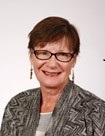By: Karen Shirer, PhD
Military families play an important role in ensuring that the U.S. military is total force ready and its service members are prepared. The Total Force Fitness model defines family readiness as “the ability of a family to use physical, psychological, social, and spiritual resources to prepare for, adapt to, and grow from the demands of military life” (NAP, 2019). Military families possess many of these strengths and resources plus they have access to other numerous resources to meet the demands of military life.
Yet, military families face unique challenges as well as the typical challenges faced by civilian families. They experience disruption, separation and loss when moving their homes and schools due to reassignment, and worry and fear when members deploy to war zones. How do we help military-connected families better weather and even thrive in the midst of these major transitions?
On August 20, 2019, Dr. Ann Masten spoke about the science of resilience and how it informs our work as military family service professionals. The webinar was the first in a series of three webinars sponsored by OneOp (MFLN), titled Nurturing Individual Resilience from a Multisystem Developmental Perspective.
Here are five key takeaways from the webinar on how we as military family service providers might support military-connected families:
Key Takeaway #1: What resilience is NOT
The concept of resilience has become a buzzword and a focus of self-help gurus that reinforce misconceptions about what resilience is NOT. Please note, resilience is NOT:
● Bouncing back after adversity
● Pulling oneself up by the bootstraps
● Returning to life just the way it was before the adversity
● Going it alone to overcome adversity
Our American culture, including the military culture, reinforces these misconceptions by our focus on rugged individualism. Unfortunately, none of these concepts gives us a full picture of what it means to be resilient as an individual.
Key Takeaway #2: What resilience is
Dr. Masten defined resilience as the capacity of a system — person, family, community, economy, society — to adapt successfully to challenges that threaten its function, survival, or positive development. Several key words in this definition are critical and are discussed in the webinars:
● System — people and families are their own unique system; the military is a system. As systems they are connected and embedded in other systems. For example, military-connected families are embedded in the military system and oftentimes a community system.
● Adapt — systems continually evolve and change; they are dynamic. Their capacity to adapt depends upon other systems around them. When a military family experiences the disruption of deployment, the systems around them provide critical support to help them prepare and work through the deployment cycle. Dr. Masten described this capacity to adapt “ordinary magic.”
Keeping in mind that military-connected families are systems within systems will provide a more robust approach to supporting them through major, and often traumatic, life experiences.
Key Takeaway #3: Resilience and Challenges Go Together
The human experience brings us challenges in the form of adversity, trauma, losses, and other threats. These challenges include natural and man-made disasters, economic recessions, war, poverty, life changing illnesses or injuries, racism, and neglect. Today’s military-connected families face challenges related to service members’ war injuries and disabilities, including traumatic brain injury, PTSD, death, and loss of limbs.
When challenges arise, resilience develops as the system identifies and deploys its strengths and resources to address them, including their own personal ones and those available in the systems around them. Researchers have identified pathways that adaptation to challenge can take. Over time, one can maintain their functioning and even grow in unexpected ways. They can also break down and recover, break down and not recover, or experience a delayed breakdown and not recover. In cases of breakdown, the possibility of recovery remains with the passing of time and/or with intervention.
We would never wish to experience adversity so that we can develop resilience or experience personal growth. However, since adversity is an inevitable fact of life, resilience gives us hope that we, and those we serve, can recover and grow from it.
Key Takeaway #4: Resilience Can Be Fostered
Successful adaptation, or resilience, after trauma or adversity depends upon a number of factors both within the individual and family, and in the systems that surround them. Dr. Masten in her book Ordinary Magic (2014) provides a shortlist of resilience factors or resources that can be drawn on during adversity:
● Close relationships
● Problem-solving skills
● Self-regulation skills
● Desire to succeed
● Faith, hope, optimism
● Purpose and belief that life has meaning
● Effective schools and other community institutions
● Well-functioning communities
You will notice that these factors are a mix of personal, family and community factors. An individual’s capacity to adapt goes beyond personal factors, although they are important, and extends to other systems including families, communities and broader societal system. In the webinar, Dr. Masten goes into great detail about how teachers and schools, communities and military matter for resilience.
Key Takeaway #5: Military Family Service Providers Play an Important Role in Fostering Resilience
Sometimes a family does not know what they need to address the challenges they face. As a military family service provider, your role involves assisting them in identifying and accessing the support and resources that are available in the systems around them. The focus needs to be on individual, family and community strengths and resources, and not on their problems and deficits. Dr. Masten suggested a series of three questions to ask when working with an individual or family to keep this focus on strengths and resources:
1. What are the challenges the military-connected family is facing? Is it trauma, loss of income, war injuries, or other things? How can risk be reduced or prevented in the future? The goal here is to identify factors that can be addressed to reduce risk and stress.
2. How is the person or family doing? What are their strengths? How are their physical and mental health? What resources or access to resources do they have? You want to help promote protective factors with the family by supporting their strengths and resources.
3. What will foster the individual or family’s resilience in this situation? What are the resources and strengths they can call on to support them through this situation? How can you help them restore, mobilize and harness the power of “ordinary magic? Here the need is to increase an individual and family’s resources.
Dr. Masten summarizes these questions into a resilience framework for taking action by framing positive goals, finding positive influences, assessing assets, preventing-promoting-protecting, and working at multiple levels and with multiple disciplines. Most of all, keep the family at the center of your approach, allowing them to tell you what they hope for and need.
The webinar contains many examples and ideas on how to engage families in building their resilience. You can find additional information about this webinar and other two webinars in the series on the Resilience Series learn event page.
Remember, for resilience prevent-promote-protect.
References
Masten, A.S. (20114). Ordinary Magic: Resilience in Development. New York: Guilford Press. ISBN: 97814625123719.
National Academies of Sciences, Engineering, and Medicine (NAP). (2019). Strengthening the Military Family Readiness System for a Changing American Society. Washington, DC: The National Academies Press. https://doi.org/10.17226/25380. Retrieved from https://www.nap.edu/catalog/25380/strengthening-the-military-family-readiness-system-for-a-changing-american-society.
Writers Biography
 Karen Shirer, previous Associate Dean of the University of Minnesota Extension Center for Family Development. Karen is also the parent of two adult daughters, a grandmother, a spouse, and a cancer survivor.
Karen Shirer, previous Associate Dean of the University of Minnesota Extension Center for Family Development. Karen is also the parent of two adult daughters, a grandmother, a spouse, and a cancer survivor.
Photo source: IStock















